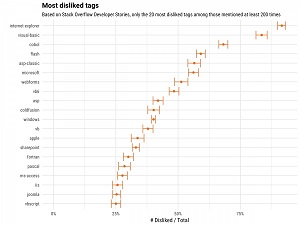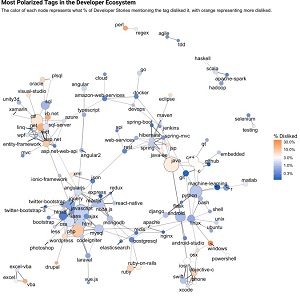Ouch! Stack Overflow Devs Really Don't Like Microsoft
So much for the "new" Microsoft.
I thought Microsoft had transformed from a hated, closed-off corporate predator into an openness champion, embracing other technologies and pleasing developers by seeking their feedback and enhancing its tooling accordingly.
I was wrong.
Microsoft programming languages, products -- and even the company itself -- graded poorly in a Stack Overflow data scientist's investigation into the most "disliked" tech offerings on the popular coding Q&A site.
SO's David Robinson used his data science skills to investigate the site's Developer Story feature (kind of an online technical resume) that lets programmers indicate with topic tags what languages, technologies and so on they'd like to work with and which ones they'd rather not work with.
To determine how "polarizing" each topic tag is, Robinson computed how often a tag it appears in someone's "disliked" tags compared to how often it appears in someone else's disliked or "liked" tags.
The study examined programming langages and other tech offerings in general, such as OSes, platforms and libraries. In that generalized category, Internet Explorer was the most disliked tag, heading up several more Microsoft offerings.
Speaking of those dislike tags, Robinson said, "Several are Microsoft technologies, particularly Internet Explorer and Visual Basic, as well as the 'Microsoft' tag ('Apple' also makes the list, though it's not as dramatically disliked)."
 [Click on image for larger view.] Most Disliked Tags (source: Stack Overflow).
[Click on image for larger view.] Most Disliked Tags (source: Stack Overflow).
But also making the list were ASP-Classic, VB6, ASP, Windows, VB, WebForms, SharePoint, Microsoft Access, IIS, VBScript and even Microsoft, clocking in at No. 6. That makes for 13 Microsoft-related offerings dominating the top 20 list.
Another anslysis invovled organizing the dislike tags into networks to represent an overall software ecosystem, quickly scannable with the help of connected, colored nodes to indicate the grouping of disliked tags. It shows a big cluster of Microsoft offerings.
 [Click on image for larger view.] Most Disliked Tags, Networked (source: Stack Overflow).
[Click on image for larger view.] Most Disliked Tags, Networked (source: Stack Overflow).
"By laying out Developer Story tags into sub-ecosystems, this network tells a story about what types of tags tend to be polarizing," Robinson said. "There are clusters of polarizing tags within the sub-ecosystems for Microsoft (centered around C# and .NET), PHP (along with WordPress and Drupal), and mobile development (particularly Objective-C). Within the cluster of operating systems (lower right), we can see that systems such as OSX and especially Windows have their detractors, but tags like Linux, Ubuntu and Unix don't."
Yet another investigation attempted to glean insights about "rivalries," measuring how often a person who likes a certain tag will dislike others. Here, "Windows" topped the chart as being most often disliked by people who said they like Linux.
There was also a little Microsoft-bashing on the Reddit social site for coders, where a link to the study was posted. One reader said, "I like C# as a language, but the whole rest of the Microsoft infrastructure and tooling puts me off." In reply, another said, "Oh god, the ecosystem sucks. But to be fair it really only sucks compared to Java. If you can get over the Microsoft lock-in (I haven't, but I can see through it now), it's not much worse than other languages."
On Hacker News, though, none of the comments mentioned Microsoft at all. I would have expected plenty of Microsoft rips on these sites, as their readers aren't known for holding back their feelings, especially of the negative variety (see here).
This makes me think the SO study might be overstating things when it comes to Microsoft ire. After all, I'm continually writing articles that indicate Microsoft has implemented some new feature or fix in response to developer feedback. I mean, again and again -- it has become a common theme. And the company seems to go out of its way to solicit feature requests, bug reports and other feedback and then act on it. Maybe "act" in another context is the operative word here, but the company's feedback-gathering efforts on the UserVoice site for Visual Studio, GitHub issues, forums and elsewhere seem genuine to me (and not because the company is infused with altruism, but rather because it just makes good business sense).
Robinson emphasized that his study wasn't intended to indict any technologies as to their quality or popularity, but rather was just measuring which ones are viewed negatively by those SO-affiliated developers who cared to share this information publicly.
He also added a personal note sharing his own thoughts, where the "polarzing" Microsoft again figures prominently.
"I don't have any interest in 'language wars,' and I don't have any judgment of users who share technologies they'd rather not work with," Robinson said. "Thinking about how polarizing Microsoft technologies often are does encourage me to share my personal experience. I've been a lifelong Mac and UNIX user, and nearly all of my programming in college and graduate school was centered around Python and R. Despite that, I was happy to join a company with a .NET stack, and I'm glad I did -- because I loved the team, the product, and the data. I can't speak for anyone else, but I'm glad I defined myself in terms of what work I wanted to do, and not something I wanted to avoid."
There's plenty more information of all types, sizes and slices in the study, which you can read more about in this article.
Posted by David Ramel on 10/31/2017